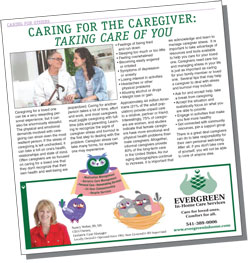Caring for the Caregiver: Taking Care of You
By Nancy Webre, BS, MS
 Caregiving for a loved one can be a very rewarding personal experience, but it can also be enormously stressful. The physical and emotional demands involved with caregiving can strain even the most resilient person. If the stress of caregiving is left unchecked, it can take a toll on one’s health, relationships and state of mind. Often caregivers are so focused on caring for a loved one that they don’t recognize that their own health and well-being are jeopardized. Caring for another person takes a lot of time, effort and work, and most caregivers must juggle caregiving with full-time jobs and parenting. Learning to recognize the signs of caregiver stress and burnout is the first step to dealing with the problem.
Caregiving for a loved one can be a very rewarding personal experience, but it can also be enormously stressful. The physical and emotional demands involved with caregiving can strain even the most resilient person. If the stress of caregiving is left unchecked, it can take a toll on one’s health, relationships and state of mind. Often caregivers are so focused on caring for a loved one that they don’t recognize that their own health and well-being are jeopardized. Caring for another person takes a lot of time, effort and work, and most caregivers must juggle caregiving with full-time jobs and parenting. Learning to recognize the signs of caregiver stress and burnout is the first step to dealing with the problem.
Caregiver stress can take many forms, for example one may experience:
- Feelings of being tired and run down
- Sleeping too much or too little
- Feeling overwhelmed
- Becoming easily angered or irritated
- Symptoms of depression or anxiety
- Losing interest in activities
- Headaches or other physical problems
- Abusing alcohol or drugs
- Weight loss or gain
Approximately 44 million Americans (21% of the adult population) provide unpaid care to a relative, partner or friend. Interestingly, 75% of caregivers are women, and studies indicate that female caregivers have more emotional and physical health problems than male caregivers. Altogether, informal caregivers provide 80% of the long-term care in the United States. As our aging demographics continue to increase, it is important that we acknowledge and learn to manage caregiver stress. It is important to take advantage of resources and tools available to help you care for your loved one. Caregivers need care too and managing stress in your life is just as important as caring for your family member or loved one.
Several tips that may help a caregiver to deal with stress and burnout may include:
- Ask for and accept help, take a break from caregiving
- Accept the situation and realistically focus on what you are able to provide
- Engage in activities that make you feel more healthy
- Get connected with community resources, join a support group
There is a great deal caregivers can do to take responsibility for their own personal well-being. After all, if you don’t take care of yourself, you will not be able to care for anyone else.
As seen in U Magazine: Caring for the Caregiver: Taking Care of You
April 2015

